- Home
- Michael Pollan
In Defense of Food
In Defense of Food Read online
In Defense of Food
Michael Pollan
Also by Michael Pollan
Second Nature
A Place of My Own
The Botany of Desire
The Omnivore’s Dilemma
FOR ANN AND GERRY,
With gratitude for your loyal friendship
and inspired editing
INTRODUCTION
AN EATER’S MANIFESTO
E at food. Not too much. Mostly plants.
That, more or less, is the short answer to the supposedly incredibly complicated and confusing question of what we humans should eat in order to be maximally healthy.
I hate to give the game away right here at the beginning of a whole book devoted to the subject, and I’m tempted to complicate matters in the interest of keeping things going for a couple hundred more pages or so. I’ll try to resist, but will go ahead and add a few more details to flesh out the recommendations. Like, eating a little meat isn’t going to kill you, though it might be better approached as a side dish than as a main. And you’re better off eating whole fresh foods rather than processed food products. That’s what I mean by the recommendation to “eat food,” which is not quite as simple as it sounds. For while it used to be that food was all you could eat, today there are thousands of other edible foodlike substances in the supermarket. These novel products of food science often come in packages elaborately festooned with health claims, which brings me to another, somewhat counterintuitive, piece of advice: If you’re concerned about your health, you should probably avoid products that make health claims. Why? Because a health claim on a food product is a strong indication it’s not really food, and food is what you want to eat.
You can see how quickly things can get complicated.
I started on this quest to identify a few simple rules about eating after publishing The Omnivore’s Dilemma in 2006. Questions of personal health did not take center stage in that book, which was more concerned with the ecological and ethical dimensions of our eating choices. (Though I’ve found that, in most but not all cases, the best ethical and environmental choices also happen to be the best choices for our health-very good news indeed.) But many readers wanted to know, after they’d spent a few hundred pages following me following the food chains that feed us, “Okay, but what should I eat? And now that you’ve been to the feedlots, the food-processing plants, the organic factory farms, and the local farms and ranches, what do you eat?”
Fair questions, though it does seem to me a symptom of our present confusion about food that people would feel the need to consult a journalist, or for that matter a nutritionist or doctor or government food pyramid, on so basic a question about the conduct of our everyday lives as humans. I mean, what other animal needs professional help in deciding what it should eat? True, as omnivores-creatures that can eat just about anything nature has to offer and that in fact need to eat a wide variety of different things in order to be healthy-the “What to eat” question is somewhat more complicated for us than it is for, say, cows. Yet for most of human history, humans have navigated the question without expert advice. To guide us we had, instead, Culture, which, at least when it comes to food, is really just a fancy word for your mother. What to eat, how much of it to eat, what order in which to eat it, with what and when and with whom have for most of human history been a set of questions long settled and passed down from parents to children without a lot of controversy or fuss.
But over the last several decades, mom lost much of her authority over the dinner menu, ceding it to scientists and food marketers (often an unhealthy alliance of the two) and, to a lesser extent, to the government, with its ever-shifting dietary guidelines, food-labeling rules, and perplexing pyramids. Think about it: Most of us no longer eat what our mothers ate as children or, for that matter, what our mothers fed us as children. This is, historically speaking, an unusual state of affairs.
My own mother grew up in the 1930s and 1940s eating a lot of traditional Jewish-American fare, typical of families who recently emigrated from Russia or Eastern Europe: stuffed cabbage, organ meats, cheese blintzes, kreplach, knishes stuffed with potato or chicken liver, and vegetables that often were cooked in rendered chicken or duck fat. I never ate any of that stuff as a kid, except when I visited my grandparents. My mother, an excellent and adventurous cook whose own menus were shaped by the cosmopolitan food trends of New York in the 1960s (her influences would have included the 1964 World’s Fair; Julia Child and Craig Claiborne; Manhattan restaurant menus of the time; and of course the rising drumbeat of food marketing) served us a rotating menu that each week completed a culinary world tour: beouf bourguignon or beef Stroganoff on Monday; coq au vin or oven-fried chicken (in a Kellogg’s Cornflakes crust) on Tuesday; meat loaf or Chinese pepper steak on Wednesday (yes, there was a lot of beef); spaghetti pomodoro with Italian sausages on Thursday; and on her weekend nights off, a Swanson’s TV dinner or Chinese takeout. She cooked with Crisco or Wesson oil rather than chicken or duck fat and used margarine rather than butter because she’d absorbed the nutritional orthodoxy of the time, which held that these more up-to-date fats were better for our health. (Oops.)
Nowadays I don’t eat any of that stuff-and neither does my mother, who has moved on too. Her parents wouldn’t recognize the foods we put on the table, except maybe the butter, which is back. Today in America the culture of food is changing more than once a generation, which is historically unprecedented-and dizzying.
What is driving such relentless change in the American diet? One force is a thirty-two-billion-dollar food-marketing machine that thrives on change for its own sake. Another is the constantly shifting ground of nutrition science that, depending on your point of view, is steadily advancing the frontiers of our knowledge about diet and health or is just changing its mind a lot because it is a flawed science that knows much less than it cares to admit. Part of what drove my grandparents’ food culture from the American table was official scientific opinion, which, beginning in the 1960s, decided that animal fat was a deadly substance. And then there were the food manufacturers, which stood to make very little money from my grandmother’s cooking, because she was doing so much of it from scratch-up to and including rendering her own cooking fats. Amplifying the “latest science,” they managed to sell her daughter on the virtues of hydrogenated vegetable oils, the ones that we’re now learning may be, well,
deadly substances.
Sooner or later, everything solid we’ve been told about the links between our diet and our health seems to get blown away in the gust of the most recent study. Consider the latest findings. In 2006 came news that a low-fat diet, long believed to protect against cancer, may do no such thing-this from the massive, federally funded Women’s Health Initiative, which has also failed to find a link between a low-fat diet and the risk of coronary heart disease. Indeed, the whole nutritional orthodoxy around dietary fat appears to be crumbling, as we will see. In 2005 we learned that dietary fiber might not, as we’d been confidently told for years, help prevent colorectal cancers and heart disease. And then, in the fall of 2006, two prestigious studies on omega-3 fats published at the same time came to strikingly different conclusions. While the Institute of Medicine at the National Academy of Sciences found little conclusive evidence that eating fish would do your heart much good (and might hurt your brain, because so much fish is contaminated with mercury), a Harvard study brought the hopeful piece of news that simply by eating a couple of servings of fish each week (or by downing enough fish oil tablets) you could cut your risk of dying from a heart attack by more than a third. It’s no wonder that omega-3 fatty acids are poised to become the oat bran of our time as food scientists rush to microencapsulate fish and algae oil and blast it into such formerly all-terrestrial foods as bread and pasta, milk and yogurt and cheese, all of which will soon, you can be sure, spout fishy new health claims. (I hope you remember the relevant rule.)
By now you’re probably feeling the cognitive dissonance of the supermarket shopper or science-section reader as well as some nostalgia for the simplicity and solidity of the first few words of this book. Words I’m still prepared to defend against the shifting winds of nutritional science and food-industry marketing, and will. But before I do, it’s important to understand how we arrived at our present state of nutritional confusion and anxiety. That is the subject of the first portion of this book, “The Age of Nutritionism.”
The story of how the most basic questions about what to eat ever got so complicated reveals a great deal about the institutional imperatives of the food industry, nutrition science, and-ahem-journalism, three parties that stand to gain much from widespread confusion surrounding the most elemental question an omnivore confronts. But humans deciding what to eat without professional guidance-something they have been doing with notable success since coming down out of the trees-is seriously unprofitable if you’re a food company, a definite career loser if you’re a nutritionist, and just plain boring if you’re a newspaper editor or reporter. (Or, for that matter, an eater. Who wants to hear, yet again, that you should “eat more fruits and vegetables”?) And so like a large gray cloud, a great Conspiracy of Scientific Complexity has gathered around the simplest questions of nutrition-much to the advantage of everyone involved. Except perhaps the supposed beneficiary of all this nutritional advice: us, and our health and happiness as eaters. For the most important thing to know about the campaign to professionalize dietary advice is that it has not made us any healthier. To the contrary: As I argue in part one, most of the nutritional advice we’ve received over the last half century (and in particular the advice to replace the fats in our diets with carbohydrates) has actually made us less healthy and considerably fatter.
My aim in this book is to help us reclaim our health and happiness as eaters. To do this requires an exercise that might at first blush seem unnecessary, if not absurd: to offer a defense of food and the eating thereof. That food and eating stand in need of a defense might seem counterintuitive at a time when “overnutrition” is emerging as a more serious threat to public health than undernutrition. But I contend that most of what we’re consuming today is no longer, strictly speaking, food at all, and how we’re consuming it-in the car, in front of the TV, and, increasingly, alone-is not really eating, at least not in the sense that civilization has long understood the term. Jean-Anthelme Brillat-Savarin, the eighteenth-century gastronomist, drew a useful distinction between the alimentary activity of animals, which “feed,” and humans, who eat, or dine, a practice, he suggested, that owes as much to culture as it does to biology.
But if food and eating stand in need of a defense, from whom, or what, do they need defending? From nutrition science on one side and from the food industry on the other-and from the needless complications around eating that together they have fostered. As eaters we find ourselves increasingly in the grip of a Nutritional Industrial Complex-comprised of well-meaning, if error-prone, scientists and food marketers only too eager to exploit every shift in the nutritional consensus. Together, and with some crucial help from the government, they have constructed an ideology of nutritionism that, among other things, has convinced us of three pernicious myths: that what matters most is not the food but the “nutrient”; that because nutrients are invisible and incomprehensible to everyone but scientists, we need expert help in deciding what to eat; and that the purpose of eating is to promote a narrow concept of physical health. Because food in this view is foremost a matter of biology, it follows that we must try to eat “scientifically”-by the nutrient and the number and under the guidance of experts.
If such an approach to food doesn’t strike you as the least bit strange, that is probably because nutritionist thinking has become so pervasive as to be invisible. We forget that, historically, people have eaten for a great many reasons other than biological necessity. Food is also about pleasure, about community, about family and spirituality, about our relationship to the natural world, and about expressing our identity. As long as humans have been taking meals together, eating has been as much about culture as it has been about biology.
That eating should be foremost about bodily health is a relatively new and, I think, destructive idea-destructive not just of the pleasure of eating, which would be bad enough, but paradoxically of our health as well. Indeed, no people on earth worry more about the health consequences of their food choices than we Americans do-and no people suffer from as many diet-related health problems. We are becoming a nation of orthorexics: people with an unhealthy obsession with healthy eating.*
The scientists haven’t tested the hypothesis yet, but I’m willing to bet that when they do they’ll find an inverse correlation between the amount of time people spend worrying about nutrition and their overall health and happiness. This is, after all, the implicit lesson of the French paradox, so-called not by the French (Quel paradoxe
?) but by American nutritionists, who can’t fathom how a people who enjoy their food as much as the French do, and blithely eat so many nutrients deemed toxic by nutritionists, could have substantially lower rates of heart disease than we do on our elaborately engineered low-fat diets. Maybe it’s time we confronted the American paradox: a notably unhealthy population preoccupied with nutrition and diet and the idea of eating healthily.
I don’t mean to suggest that all would be well if we could just stop worrying about food or the state of our dietary health: Let them eat Twinkies! There are in fact some very good reasons to worry. The rise of nutritionism reflects legitimate concerns that the American diet, which is well on its way to becoming the world’s diet, has changed in ways that are making us increasingly sick and fat. Four of the top ten causes of death today are chronic diseases with well-established links to diet: coronary heart disease, diabetes, stroke, and cancer. Yes, the rise to prominence of these chronic diseases is partly due to the fact that we’re not dying earlier in life of infectious diseases, but only partly: Even after adjusting for age, many of the so-called diseases of civilization were far less common a century ago-and they remain rare in places where people don’t eat the way we do.
I’m speaking, of course, of the elephant in the room whenever we discuss diet and health: “the Western diet.” This is the subject of the second part of the book, in which I follow the story of the most radical change to the way humans eat since the discovery of agriculture. All of our uncertainties about nutrition should not obscure the plain fact that the chronic diseases that now kill most of us can be traced directly to the industrialization of our food: the rise of highly processed foods and refined grains; the use of chemicals to raise plants and animals in huge monocultures; the superabundance of cheap calories of sugar and fat produced by modern agriculture; and the narrowing of the biological diversity of the human diet to a tiny handful of staple crops, notably wheat, corn, and soy. These changes have given us the Western diet that we take for granted: lots of processed foods and meat, lots of added fat and sugar, lots of everything-except vegetables, fruits, and whole grains.

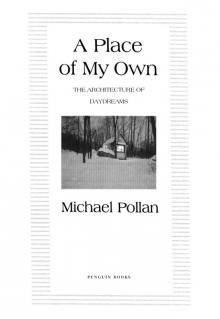 A Place of My Own: The Education of an Amateur Builder
A Place of My Own: The Education of an Amateur Builder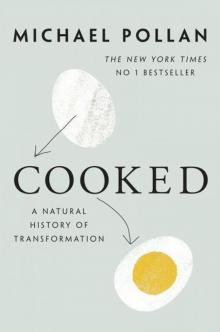 Cooked: A Natural History of Transformation
Cooked: A Natural History of Transformation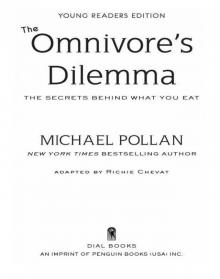 The Omnivore's Dilemma
The Omnivore's Dilemma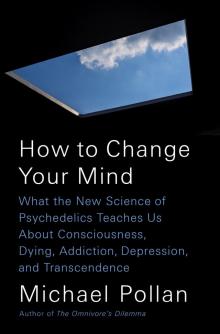 How to Change Your Mind
How to Change Your Mind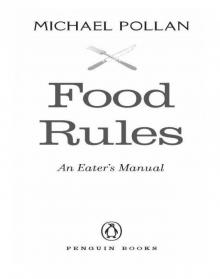 Food Rules
Food Rules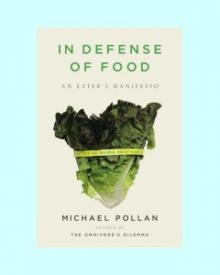 In Defense of Food
In Defense of Food A Place of My Own
A Place of My Own